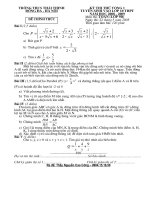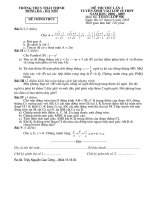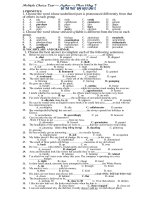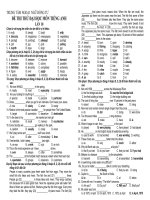key for de thi thu lan 10
Bạn đang xem bản rút gọn của tài liệu. Xem và tải ngay bản đầy đủ của tài liệu tại đây (149.59 KB, 4 trang )
TRUNG TÂM NGOẠI NGỮ HỒNG TƯ
ĐỀ THI THỬ ĐẠI HỌC MÔN TIẾNG ANH
LẦN 10
Chọn từ có trọng âm nhấn vào âm tiết ở vị trí khác:
1. A. myth B. breath C. tooth D. with
2. A. biscuits B. magazines C. newspapers D. vegetables
3. A. packed B. punched C. pleased D. pushed
4. A. call B. cup C. coat D. ceiling
5. A. month B. boss C. shop D. got
Chọn phương án (A hoặc B, C, D) ứng với từ có trọng âm chính nhấn vào âm
tiết có vị trí khác với ba từ còn lại trong câu:
6. A. become B. between C. improve D. forward
7. A. assistant B. holiday C. colony D. possible
8. A. faithfully B. sincerely C. completely D. extremely
9. A. figure B. ever C. apply D. happy
10. A. salary B. essential C. industry D. interview
Từ vựng: Chọn phương án đúng (A hoặc B, C, D) để hoàn thành mỗi câu
sau:
11. We love HANOI, ___________ in the spring.
A. mostly B. most C. especially D. specially
12. Are you looking for anything in ___________ ?
A. special B. detail C. peculiar D. particular
13. Dress ___________ when you go for an interview. Don’t wear your Jeans.
A. nice B. nicely C. smart D. newly
14. Mexico is the most popular vacation _____ for people from The United States.
A. target B. connection C. departure D. destination
15. To the best of my ___________ , he married an Irish girl
A. retention B. recall C. memory D. recollection
16. Every Sunday we ___________ go walking in the park.
A. seldom B. usually C. rarely D. never
17. We’ll play tennis and ___________ we’ll have lunch.
A. so B. after C. immediately D. then
18. I feel terrible, I didn’t sleep ___________ last night.
A. an eye B. a wink C. a jot D. an inch
19. This is the most expensive car I have ___________ driven.
A. ever B. always C. often D. sometimes
20. The ___________ at the football match because violent when their team lost.
A. spectators B. groups C. observers D. customers
Đọc kỹ đoạn văn sau và chọn phương án đúng (A hoặc B, C, D) cho mỗi chỗ
trống từ 21 đến 30:
People in many countries grow fresh water fish from eggs. They move the small
fish into lakes and rivers. The fish live and (21) ___________ there. People go
(22) ___________ in these lakes and rivers. They enjoy catching fish because
fish is also good food. Now the Japanese grow salt water fish. Most of them are
yellow tail fish. Workers grow the fish from eggs. Every time they feed the fish,
they play (23) ___________ of piano music. The fish (24) ___________that
piano music means food. When the fish are small, the Japanese put them into
the ocean near the land. The fish find some of their (25) ___________ food.
Workers also feed them. They play the same piano music. The fish (26)
___________know the music. They swim toward it and (27) ___________ the
food. In (28) ___________months the fish are large. The Japanese play the
same music. The fish swim toward it and the workers (29) ___________ them.
The Japanese get about 15 percent of their seafood (30) ___________farms in
the ocean.
21. A. bread B. born C. grow D. develop
22. A. enjoying B. fishing C. shopping D. catching
23. A. songs B. films C. tapes D. lot
24. A. think B. recognize C. realize D. learn
25. A. own B. own’s C. self D. self’s
26. A. recently B. mostly C. nearly D. already
27. A. see B. find C. bite D. hold
28. A. few B. a few C. couple D. many
29. A. grasp B. catch C. seize D. hold
30. A. on B. of C. from D. in
Văn phạm: Chọn phương án đúng (A hoặc B, C, D) để hoàn thành mỗi câu
sau:
31. Not until 1856 ___________ across the Mississippi River
A. the first bridge was built B. was the first bridge built
C. the first building a brdge D. the bridge building was
32. The cost of living has ___________ over 10 percent in the past years.
A. raised B. raise C. risen D. rising
33. Now men and women remain single longer than they once ___________
A. do B. did C. doing D. were done
34. Two thousand miles ___________ a long distance.
A. are B. make C. have D. is
35. When it began to rain, they ___________ in the yard
A. played B. were playing C. have played D. had played
36. He ___________ on his English study all yesterday evening
A. used to work B. had worked C. was working D. working
37. These chairs are ___________ better than the others.
A. as B. very C. much D. either
38. Why did Berth ask you ___________ a bicycle ?
A. that if you had B. do you have C. that you had D. if you had
39. Malaria is a disease ___________ by the anopheles
A. transmit B. transmitting C. is transmitted D. transmitted
40. Is swimming under water very difficult ?
No, it’s just a matter ___________ able to control your breathing
A. to be B. of being C. that you are D. being
41. Ceylon is ___________the South of India.
A. to B. in C. at D. below
42. Come with me. I’m seeing “ The killer” tomorrow. ___________
A. Are you? B. Do you? C. Will you? D. Shall you?
43. My sister was born ___________.
A. at 1975, in April B. On April, 1975 C. 1975, at April D. in April, 1975
44. No one has ever asked me that question before.
In the passive voice:
A. That question has ever been asked me by no one before.
B. That question has never been asked me before by anyone
C. I have not ever been asked that question before
D. I have never been asked that question before
45. Our teacher said “The Second world war broke out in 1939”.
Indirect speech: ___________
A. Our teacher told us that the Second world war had broken out in 1939
B. Our teacher told that the Second world had broken out in 1939
C. Our teacher said that the Second world war broke out in 1939
D. Our teacher said us that the Second world war had broke out in 1939
46 When ___________? In 1928
A. penicillin was discovered B. did penicillin discovered
C. was penicillin discovered D. did penicillin discover
47. What’s it ___________? A flute.
A. told B. called C. said D. spoken
48. They can’t work. They are too tired
A. When they are too tired, they can work
B. Because they can’t work, they’re too tired
C. They are too tired that they can’t work
D. They are too tired to work
49. The girls and flowers ___________ he painted were vivid.
A. Who B. Which C. Whose D. That
50. All night long people dance and sing. They do it ___________
A. during the whole night B. in all the night C. the night long D. in the night
51. After he ___________ work, he went straight home
A. had finished B. had been finishing C. has finished D. would finish
52. What did you think of the book ?
___________ the books I’ve read. It was the most interesting
A. From all B. All C. All of D. Of all
53. I can’t see the stage very well from here. “___________”
A. Neither can’t I B. Neither I can C. I can’t neither D. Neither can I
54. I applied for the job that I saw ___________ in the paper.
A. advertising B. advertised C. be advertised D. being advertising
55. He’d prefer ___________ chicken soup rather than ___________ milk
A. having / having B. to have / drink C. have / drink D. had / drank
Chọn phương án (A hoặc B, C, D) ứng với từ / cụm từ có gạch chân cần phải
sửa trong các câu sau:
56. MRS. Stevens, along with her cousins from New Mexico, are planning to
A B C D
attend the festivities.
57. Hung Yen has long been well - known for it’s excellent longan fruits
A B C D
58. As soon as we’ve finished supper, we’ll all go to downtown to see our friends.
A B C D
59. The 6 - year - old boy resembles to his mother some what more than does his
older brother A B C D
60. I want to live for h undred years.
A B C D
Đọc kỹ đoạn văn sau và chọn phương án đúng (A hoặc B, C, D) cho mỗi câu
từ 61 đến 65.
Over the past 600 years, English has grown from a language of few speakers to
become the dominant language of international communication. English as we
know it today emerged around 1350, after having incorporated many elements
of French that were introduced following the Norman invasion of 1066. Until the
1600s, English was, for the most part, spoken only in England and had not
extended even as far as two centuries, English began to spread around the
globe as a result of exploration, trade (including slave trade), colonization, and
missionary work. Thus, small enclaves of English speakers became established
and grew in various parts of the world. As these communities proliferated,
English gradually became the primary language of international business,
banking and diplomacy.
Currently, about 80 percent of the information stored on computer systems
worldwide is English. Two - thirds of the world’s science writing is in English,
and English is the main language of technology, advertising, media,
international airports, and air traffic controllers - Today there are more than 700
million English users in the world, and over half of these are nonnative
speakers, constituting the largest number of nonnative users than any other
language in the world.
61. What is the main topic of this passage?
A. The French influence on the English Language.
B. The English history.
C. The expansion of English as an international language.
D. The use of English for science and Technology.
62. Approximately when did English begin to be used beyond England?
A. in 1066 B. around 1350 C. before 1600 D. after 1600
63. According to the passage, all of the following contributed to the spread of
English around the world except.
A. the slave trade B. the Norman invasion C. missionaries D. colonization
64. The word “enclaves” in line 6 could be best replaced by which of the following.
A. communities B. organizations C. regions D. countries
65. The word “proliferated” in line 7 is closest in meaning to which of the following
A. prospered B. organized C. disbanded D. expanded
Đọc kỹ đoạn văn sau và chọn phương án đúng (A hoặc B, C, D) cho mỗi câu
từ 66 đến 70:
Many people are unaware of how pesticides affect our food supplies. Health risks
are the inevitable result. Pesticides can run off into nearby streams, where they
are carried from their original dispersal site. This is how pesticides end up in
drinking water, fish and game. And because of wind, rain, and evaporation,
residues routinely show up in animals in the remostest parts of the world. For
example, if grain fields on rough lands are sprayed with pesticides, residue can
show up in poultry, eggs, milk, and butter. The end result is that every food we
eat carries pesticides as the inevitable consequence of spraying crops with
these poisons. And human exposure doesn’t even end there residue are
transferred from mother to child through the placenta and mother’s milk.
66. The main idea of this paragraph is that
A. pesticides pose great danger to human life.
B. pesticides poison our drinking water by entering our groundwater and
streams.
C. pesticides residues spread through – out our food chain
D. pesticides residues are found throughout the world.
67. According to the paragraph, children ingest pesticides by way of
A. eating poultry and eggs B. various foods and liquids
C. contaminated drinking water D. their mother’s milk
68. Pesticides residues wind up in poultry, eggs, and butter because
A. crops grown for animal feed are sprayed with pesticides.
B. cows and chickens drink large quantities of contaminated water.
C. farmers are careless about cleaning their fields after harvest.
D. pesticides become harmless after killing insect pests.
69. A lesson that can be learned from the use of pesticides by washing our fruits and
vegetables.
A. canned or frozen foods are much safer than fresh produce.
B. most of us can avoid the effects of pesticides by washing our fruits and
vegetables.
C. before world war II, farmers were able to grow crops without pesticides.
D. our government should ban pesticides used in our food.
70. Which of the following sentences is an opinion?
A. Pesticides end up in drinking water, fish and game.
B. The government exaggerates the dangers of pesticides in our food
supplies.
C. Residues are transferred from mother to child through the placenta.
D. The food we eat contains pesticides from crop sprays.
Chọn phương án (A hoặc B, C, D) ứng với câu có nghĩa gần nhất với mỗi
câu cho sẵn sau đây:
71. The game will be held, rain or shine
A. The game is delayed because of the rain
B. There will be no game if it rains
C. There will be a game regardless of the weather
D. It rains every time there is a game.
72. If only I had not seen her.
A. I wish I had seen her B. I wish I had not seen her
C. I have not seen her for ages D. She wishes she had come to see me
73. I’m sorry that he won’t accept the job he’s been offered.
A. I wish he would accept the job he’s been offered
B. I wish he had accept the job he’s been offered
C. I wish he would have accepted the job he’s been offered
D. I wish he will accept the job he’s been offered
74. Despite the fact that it was snowing, I felt warm.
A. In spite of snowing, I felt warm
B. In spite of feeling warm, it was snowing
C. Although it was snowing, I felt warm
D. Although I felt warm, it was snowing
75. I often get up early.
A. I am used to get up early B. I can get up early
C. I like to get up early D. I am used to getting up early
Chọn phương án (A hoặc B, C, D) ứng với các câu tốt nhất được tạo ra bằng
những từ cho sẵn:
76. Opinion / football match / fair
A. My opinion was fair about the football match.
B. In my opinion, I think that the football match was fair.
C. According to my opinion, the football match was fair.
D. In my opinion, the football match was fair
77. I / have / air_conditioner / fix / tomorrow.
A. I will have an air_conditioner fixing tomorrow.
B. I will have an air_conditioner fixed tomorrow.
C. I will have someone getting an air_conditioner fixed tomorrow.
D. I have an air_conditioner fixed tomorrow.
78. Provide / your handwriting / legible / test scorer / accept / your answer.
A. providing with your legible handwriting, every test scorer must accept your
answer.
B. providing your handwriting is legible, the test scorer does not accept your
answer.
C. provided for your legible handwriting, the test scorer has to accept your
answer.
D. provided that your handwriting is legible, your answer will be accepted
by any test scorer.
79. The patient / recover / more / rapidly / expected.
A. The patient recovered rapidly he expected more than.
B. The patient has recovered more rapidly he expected.
C. The patient recovered more rapidly than expected.
D. The patient rapidly recovered than he more expected.
80. I’d / play football / rather / watch / it / T.V
A. I’d prefer to play football rather than watching it on T.V.
B. I’d prefer playing football than watching it on T.V.
C. I’d prefer to play football rather than watch it on T.V.
D. I’d prefer rather play football rather than watch it on T.V.
ĐÁP ÁN ĐỀ TRẮC NGHIỆM 1
1. D 41. A
2. A 42. C
3. C 43. D
4. D 44. D
5. A 45. C
6. D 46. C
7. A 47. B
8. A 48. D
9. C 49. D
10. B 50. A
11. C 51. A
12. D 52. D
13. B 53. D
14. D 54. B
15. D 55. B
16. B 56. C
17. D 57. C
18. B 58. D
19. A 59. B
20. A 60. D
21. D 61. C
22. B 62. D
23. C 63. B
24. C 64. A
25. A 65. A
26. D 66. A
27. B 67. D
28. B 68. A
29. B 69. D
30. A 70. B
31. B 71. C
32. C 72. B
33. B 73. A
34. D 74. C
35. B 75. D
36. C 76. D
37. C 77. B
38. D 78. D
39. D 79. C
40. B 80. C









